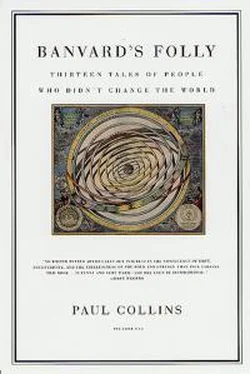By the time Coates gave his benefit performance at the Haymarket Theatre, his fame had grown so that well before the six-thirty curtain call, more than a thousand Londoners were turned away at the door; the theater was already packed. Desperate ticket seekers pounded on the stage door and offered bribes of much as l5--an enormous sum for a ticket in those days--just to sneak in through the back door. They too were turned back.
Inside the theater, trouble was already brewing. The young men who had come to pillory Coates were hooting and hollering at Coates's friends as they filed in; the rest of the audience fidgeted as six-thirty came and went and as the clock ticked past seven. At long last, the curtain rose, and when eventually Coates strolled onstage, the Haymarket resounded with whistling, applause, and shouts of Cock-a-doodle-doo! Coates wore a grand mantle of pink and silver silk, jewels flashing throughout his person. His hat was once again topped with high plumes of white feathers, and his shoes sported large diamond buckles. The audience came to such an uproar over him that the curtain came down during the fourth act.
The next day, on December 10, London papers attacked the performance with a disdain that Coates could not ignore; cartoonists feasted upon his outrageous dress, and there was much sniggering about the dark-skinned and gay Romeo. His country of origin was a tempting target: darkened by years in the sun, Coates's skin was a little like that of a black man--and indeed, some whispered, maybe was that of black man.
His enemies had a point. Given the secret bloodlines of slave-holding islands like Antigua, the only real surprise might have been to find that Coates was not somewhat black. And as for the suspicious dandiness of his apparel, which was outlandish even for 1811, the following day a letter in Coates's hand arrived at the offices of the Morning Herald, the one paper that all of fashionable London was sure to read:
In regard to the innumerable attacks that have been made upon my lineaments and person in the public prints, I have only to observe, that as I was fashioned by the Creator, independent of my will, I cannot be held responsible for that result, which I could not control.
Coates would neither confirm nor deny anything. But whatever he was, he would also never apologize for it--for like Quentin Crisp over a century later, he didn't know how he could be anything else.
Coates appeared in only one more performance the following year, but by 1813
he was reinvigorated, and in the first four months of the year he headlined at least half a dozen shows. Some patrons arrived primed to heckle him, and others to shout on his ever-increasing flights of histrionics. So when an appearance by "the Celebrated Amateur of Fashion" was promised after a performance of Othello, curious audience members waited past the end of the play to see just exactly what was promised to them.
The curtain rose to reveal Coates sitting at a table set upon the stage, a decanter before him, drinking his wine contentedly. He looked up and smiled at his audience, and then strolled over to the edge of the stage, glass in hand, where he "drank to the health of his enemies, whom he desired might live to see him prosper." He then launched into a poetic recitation.
The strange sight before them--a single actor onstage drinking wine and inviting the audience down for a drink, as it were--was unlike any stage
performance seen at the Haymarket before. Whatever was left of the fourth wall of drama was gone now, with Coates simply refusing to recognize it, and addressing the audience as if he were having a drink with each one of them personally.
The crowd roared its approval, and when he exited, it begged for him to return. Coates, however, had vanished.
The public had embraced Coates, but it was his dearest wish to be close to royalty. Despite his friendships with dukes and barons, including some he had known since his childhood, Robert had gone all these years in England without securing a meeting with the Prince of Wales. His hopefulness that such a meeting would take place was touching, even pathetic, and could hardly fail to be noticed by those around him.
That spring of 1813, an engraved invitation card arrived at 38 Craven Street, addressed to Coates. Upon opening it, he could scarcely contain himself: he was invited to a royal party the following night! The next day was a whirlwind of activity, as he spared no expense in fitting himself out for the royal bash. He bought new diamond buttons, a diamond brooch, and a diamond ring for the occasion; his personal tailor was set to work assembling a new outfit of the finest silk, and a bootmaker brought in to create a new diamond-buckled creation.
As Coates made his way to Carlton House that fateful night in his magnificent carriage, the Prince's entourage, courtiers, and officers had already made their way inside, through the vestibule and up the crimson-carpeted staircase, and into the grand salon where the Prince was holding court. A steady procession of military officers, court officials, posh dandies, and ruffled ladies arrived.
As the Prince amused himself by listening to a performance by the court musician, a member of his staff came forward bearing a card tray.
"What is it, Bloomfield?"
The Prince picked up the invitation card from the tray and peered at it through a gold eyeglass.
"A manifest forgery!" Eyebrows rose in the room. "Someone has taken an unpardonable liberty in concocting this."
Guests drifted forward to look at the spurious card.
"Do you know this person, Brummell?" asked the Prince of one court dandy as he passed the card to him.
Brummell gave a look of horror.
"I know him! Why, he makes sugar and sells coffee--in short, he is a sort of grocer. How could I know such a man?"
The card was passed to another court dandy.
"Do you know him, Alvaney?"
"Is it the black fellow who played Romeo?" Alvaney passed the card along. "Of course, I don't know him in the least."
"Is he a friend of yours, Sherry?"
"Not that I know of. But were it possible for the poor man to patronize me handsomely, I couldn't be so hard-hearted as to object to his presence."
The assembled crowd had a good laugh at Coates's generous ways, whereupon Sherry turned serious.
"The person is not presentable; that style of thing cannot be permitted here, positively."
The Prince, though perhaps a little sorry for the fellow waiting at his gate, had to agree.
"I do not like this affair at all."
He summoned Colonel Bloomfield.
"Go to this gentleman, and undcv him in a way not to hurt his feelings--taking care to express the extreme regret of the Prince of Wales that such an accident should have occurred."
And so Bloomfield glided out to dispatch Romeo Coates, who, still waiting patiently to enter Carlton House, was imagining the grandeur that awaited him.
At seemingly every block on his way home, Coates's magnificent coach was halted by the wave and Hallo! of some fashionable man about town.
"My dear sir! Let me congratulate you on your well-deserved distinction! Of course you found His Royal Highness a most charming host?"
"Oh, there was some irregularity ... I do not understand what. But the Prince sent a most kind message. I have no doubt that His Royal Highness will speedily set it right."
And as the Amateur of Fashion passed onward, each man sniggered. It seemed that everyone but Coates knew that he had been the victim of cruel hoax. Or rather, it would have been cruel had its intended victim ever come to realize what had happened. But Coates never seemed to entertain any such notion. He was not a man who imagined the worst of the people around him, though he might have been justified to do so with London's aristocracy. Instead, he truly believed that there had been some sort of misunderstanding, and that sooner or later his proper invitation to meet His Royal Highness would come.
Читать дальше











